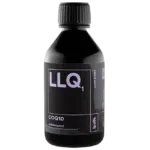
10 IMPRESSIVE BENEFITS OF COENZYME Q10 (COQ10)
Table of Contents
Let’s take a trip down memory lane to high school biology and recall that vital fact: the mitochondria is the cell’s powerhouse. You might have thought this little piece of information would never be relevant outside of the classroom, but guess what? Here we are.
Coenzyme Q10, also known as CoQ10, ubiquinone, vitamin Q10, and Q10, is closely connected to this cellular powerhouse. As a highly sought-after supplement on the market today, CoQ10 is integral to various bodily functions and systems, making it a crucial micronutrient for overall health and wellbeing.
In 1957, Peter Mitchell from the University of Wisconsin-Madison first emphasized CoQ10’s significance in transporting energy to cells, a discovery that earned him the Nobel Prize in 1978.
Since then, CoQ10 has been found to play a myriad of vital roles within the body. It’s high time we all become familiar with this powerful nutrient and its numerous benefits.
WHAT EXACTLY IS COQ10?
Supplements with alphanumeric names might seem intimidating or overly complex at first glance. However, understanding the basics of CoQ10 is actually quite straightforward.
CoQ10 is a fat-soluble compound, which means your body can produce it, and it’s best consumed with food – particularly fatty foods. As a coenzyme, CoQ10 supports other compounds in your body, helping them function effectively. In addition to assisting in breaking down food into energy, CoQ10 also acts as an antioxidant, offering numerous health benefits that we’ll explore further below.
While CoQ10 is naturally produced in the body, its production may begin to decline as early as the age of 20 in some individuals. CoQ10 is present in most body tissues, with the highest concentrations found in energy-demanding organs such as the pancreas, kidneys, liver, and heart. Among the organs, the lungs have the lowest levels of CoQ10.
Being an integral component of our bodies (found in every cell), CoQ10’s effects on human health are extensive and diverse.
CoQ10 exists in two forms: ubiquinone and ubiquinol.
Ubiquinol is the predominant form in the body, as it is more bioavailable for cellular use. This is particularly important for mitochondria, as it assists in producing the energy we require daily. Supplements often utilize the more bioavailable form, which is typically derived from fermenting sugar cane and beets with specific yeast strains.
CoQ10 deficiency is relatively uncommon and usually results from aging, certain diseases, genetic factors, nutritional deficiencies, or stress.
While deficiency may not be widespread, it’s still essential to monitor your CoQ10 intake due to the numerous benefits it offers. In honor of this versatile compound, here are 10 ways CoQ10 contributes to your body’s overall wellness:
HEART CONDITIONS & HIGH BLOOD PRESSURE
CoQ10 supplementation is renowned for its heart health benefits, and the evidence supporting this claim is substantial.
High blood pressure (hypertension) is a significant risk factor for heart diseases. Better systolic and diastolic blood pressure readings can help reduce the risk of cardiovascular issues, with systolic pressure being the more prominent indicator.
An analysis of 12 different trials showed that CoQ10 supplementation effectively lowered systolic blood pressure by up to 17 mm Hg and diastolic blood pressure by up to 11 mm Hg.
But CoQ10’s heart-related benefits don’t end there.
One randomized controlled trial discovered that supplementing with CoQ10 reduced the risk of death from adverse heart events and alleviated symptoms of moderate to severe heart failure. Additionally, those treated with CoQ10 experienced fewer hospitalizations than those who were not. Some studies have also suggested that CoQ10 may help minimize the heart damage caused by certain chemotherapy treatments.
In relation to chemotherapy medications like Adriamycin and anthracycline, it is essential to consult with a physician before proceeding.
The advantages of CoQ10 for heart health are thought to arise from its capacity to restore proper energy production in the heart, thus enhancing its functionality. Additionally, this compound offers protection against oxidative stress, contributing to the preservation of healthy tissues and defense against chronic illnesses.
BRAIN HEALTH
Regarding oxidative stress, the brain is especially vulnerable to oxidative damage due to its high fatty acid composition. Oxidative stress originates from free radicals, charged particles produced by metabolism and environmental factors, such as poor air quality.
Oxidative damage generates harmful compounds associated with chronic conditions, potentially impacting memory, physical functions, and cognitive abilities. However, CoQ10 is believed to help decrease these detrimental compounds.
In the context of Alzheimer’s, CoQ10 has been investigated as a potential means of alleviating the disease’s effects. Although CoQ10’s efficacy for Alzheimer’s disease was considered relatively low, its safety was highly rated. While CoQ10 might not be the most suitable option for a condition like Alzheimer’s, its influence on energy levels is believed to contribute to brain health.
For instance, CoQ10 deficiency may manifest as symptoms such as mental fatigue and feelings of exhaustion. If CoQ10 can alleviate these symptoms by promoting energy production and supporting mitochondrial function, it suggests that it may also have a positive impact on brain health.
HEADACHES & MIGRAINES
Headaches are fairly common worldwide, but migraines represent a more severe form. Affecting approximately 1 in every 7 adults globally, migraines are a significant subject of research.
CoQ10 has been proposed as a potential natural solution for migraines. Research suggests a connection between mitochondrial dysfunction and certain types of migraines, which may be linked to CoQ10 deficiencies in some cases, as symptoms can include brain fog and headaches. However, studies indicate there could be more to this relationship.
One study discovered that CoQ10 supplementation effectively reduced migraine symptoms when compared to a placebo group. Participants who took the supplement experienced a decrease in migraine frequency and intensity.
LUNG HEALTH
Although CoQ10 is present in all tissues, it is found in the lowest concentrations within the lungs. Moreover, the lungs are more susceptible to oxidative damage due to the oxygen passing through them.
This oxidative damage increases the risk of developing asthma and chronic obstructive pulmonary disease (COPD). COPD, in particular, has been demonstrated to benefit from CoQ10 supplementation, as it aids in reducing inflammation and enhancing cellular activity. Considering that COPD tends to worsen with age and CoQ10 production also declines as we age, supplementation becomes crucial and effective for maintaining lung health.
BOOSTING PHYSICAL PERFORMANCE
Given CoQ10’s involvement in cellular energy production, it is logical that this compound would have a significant impact on exercise performance. CoQ10 plays a crucial role in producing adenosine triphosphate (ATP), a compound essential for various physical processes, including muscle contractions.
Abnormal mitochondrial function can result in reduced muscle energy, making it harder for muscles to contract and sustain output, which may hinder the progress of your fitness goals.
Oxidative stress can also impair muscle function since it affects these tissues, consequently diminishing physical performance. By enhancing energy levels in cells and combating oxidative stress, CoQ10 may also potentially help alleviate fatigue.
HELPING INFERTILITY
CoQ10 plays a significant role in promoting the health of eggs and sperm within the reproductive system.
Research has indicated that men who were supplemented with CoQ10 daily experienced improvements in sperm motility, count, and morphology. Similarly, positive effects on egg quality have been observed in women, particularly for those attempting to conceive at a later stage in life.
SKIN HEALTH
Owing to CoQ10’s impact on oxidative stress, it can be beneficial as a topical application for maintaining healthy skin.
It has been demonstrated to raise the level of quinone on the skin’s surface, a compound utilized for lightening freckles and skin spots. As a result of CoQ10’s influence on free radicals, its topical use may yield positive effects on aging, thinning skin, wrinkles, freckles, and age spots.
BLOOD SUGAR LEVELS
A 2015 study indicated that mitochondrial dysfunction contributes to Type II diabetes. Given that diabetes is a chronic inflammatory disease worsened by oxidative stress, CoQ10 can be a highly beneficial supplement.
Researchers propose that CoQ10 supplementation may potentially result in improved glycemic control. However, further research is necessary to confirm these findings.
STATIN-INDUCED MYOPATHY
Statin is a medication prescribed to individuals with a high risk of cardiovascular disease. Its primary purpose is to reduce cholesterol levels; however, a severe side effect is myopathy.
Myopathy is a condition in which muscle fibers do not function properly. Studies have demonstrated that CoQ10 supplementation reduces the occurrence of symptoms when compared to placebo groups.
TREATING PARKINSON’S
Although research on this topic is not yet definitive, there is evidence suggesting that CoQ10 supplementation can significantly decrease the progression of disabilities in individuals with Parkinson’s disease.
The study utilized relatively large doses, with participants taking 1,200 mg of CoQ10 daily.
The Effects of Coenzyme Q10 and Its Deficiency
If you’re still not convinced of the importance of CoQ10, it’s worth noting that this compound is crucial for maintaining a healthy, well-functioning body. But how can you determine if you’re getting enough of this remarkable substance?
A typical CoQ10 dosage ranges from 90 mg to 200 mg per day, though doses up to 500 mg have been generally well-tolerated. Some studies have even used higher dosages without adverse effects, including up to 1,200 mg over a 16-month period.
One reason for this low toxicity is that CoQ10 is not stored in the body but is produced instead. Since it’s not stored, it’s necessary to consume it regularly, preferably along with other food.
Nonetheless, side effects can occur, such as:
- Loss of appetite
- Nausea
- Vomiting
- Diarrhea
- Upper abdominal pain
- Headaches
- Insomnia
- Rashes or itchiness
These side effects are relatively rare. If they do occur, it’s advisable to either halve or divide the dosage into thirds and take the reduced amount instead of the full initial dosage.
The most significant interaction of CoQ10 is with anticoagulants, also known as blood thinners. CoQ10 may potentially reduce their effectiveness, increasing the risk of blood clot formation. Additionally, there is some evidence suggesting that CoQ10 might decrease the efficacy of certain chemotherapy treatments, so it’s essential to consult a physician before supplementing.
DAILY DOSES FOR POSITIVE EFFECTS OF COQ10
The most significant decline in CoQ10 production occurs as one ages. This reduction can begin as early as 20, but the levels produced by the body drop more drastically after the age of 40.
Other factors that may contribute to a deficiency include:
- Increased tissue demands due to aging
- Mitochondrial diseases
- Side effects from statin treatment
- Vitamin B6 deficiency (or other nutritional deficiencies)
- Genetic defects interfering with CoQ10 synthesis or utilization
Given the limited side effects and numerous benefits, taking CoQ10 supplements could be advantageous, even without an explicit deficiency. For instance, heart attack patients who took CoQ10 supplements experienced a significantly lower risk of recurrent cardiac events.
Symptoms of CoQ10 deficiency may include fatigue, exhaustion, difficulty concentrating, mood swings, depression, and brain fog. However, it’s crucial to remember that these symptoms could indicate various other health issues, and a CoQ10 deficiency is not guaranteed. A definitive diagnosis requires a blood test, which can only be performed by a healthcare practitioner.
DIETARY COENZYME Q10 SUPPLEMENTATION
CoQ10 is present in a variety of foods, but red meat, particularly organ meats such as heart, liver, and kidneys, is the best source. Muscle meats also contain CoQ10 but in lesser amounts.
Fatty fish is another excellent source, including herring, mackerel, sardines, salmon, and tuna. Vegetable oils, such as sesame seed oil and canola oil, contain some CoQ10, but the levels are not as high as those in animal products.
Seeds and nuts are also sources of CoQ10, with sesame seeds and pistachios being the most reliable sources. Soybeans are also a good source. However, fruits and vegetables contain less CoQ10 than seeds and nuts.
While oranges, strawberries, and avocados contain some CoQ10, one would have to consume a staggering 220 pounds of oranges to obtain 100 mg of CoQ10. Thus, obtaining sufficient CoQ10 through dietary means alone is challenging. Hence, it is advisable to pay attention to one’s diet and consider supplementing to ensure adequate intake of CoQ10.
SUPPLEMENTING WITH COQ10
The easiest way to maintain consistent CoQ10 levels is by regularly taking a dietary supplement. However, when supplementing, it is essential to keep a few things in mind.
Ensure that you are using high-quality products since production standards are not as stringent as those for food and drug products. For example, our CoQ10 supplement formula involves encapsulating the supplement in lipid molecular structures to enhance its bioavailability. The more bioavailable the supplement, the greater the benefit to your body.
Using an optimized supplement can help you maintain your health, but it takes a holistic approach to wellness to truly thrive.
HEALTH BENEFITS OF HELPING COQ10 HELP YOU
While supplements can be beneficial, they are not a magical solution to achieving good health. To attain wellbeing, several factors must be considered.
Diet is paramount. It’s often stated that you cannot out-exercise a poor diet, which is especially true when it comes to taking care of your general health. It’s also important to vary your diet with a variety of whole, clean foods to ensure that you obtain a variety of nutrients. Additionally, incorporating spices into your diet can provide not only flavor but also immune-boosting compounds.
Regular physical activity is also crucial for maintaining health. Exercise can enhance your mood, improving your mental health, and keep your body strong and agile.













